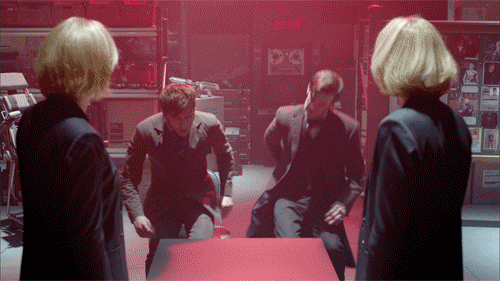Counting Down The Eleven Best Episodes Of The Eleventh Doctor
Bidding farewell to Matt Smith, the eleventh Doctor Who.

When the long-running British science fiction TV show/institution Doctor Who announced that a largely-unknown actor named Matt Smith would be playing the Eleventh Doctor, there was a healthy amount of scepticism. At 26 years of age, he was easily the youngest actor to play the part. And as someone who, like many others, grew up with an image of The Doctor as a sort-of-irresponsible father figure, this did not sit well with me.
Approximately two seconds into his debut, though, it was clear that he was totally perfect. (That two second measurement is no exaggeration: as Tenth Doctor David Tennant regenerated into Smith’s Eleventh, Smith let out a pained shout followed immediately by a look of surprise, as if he’d alarmed himself with his own birthing pains. I was immediately won over.)

Four years after he first appeared, Smith has left the role. His final episode, The Time of the Doctor, aired yesterday in Australia. Like all regenerations, this one was bittersweet, as we bade farewell to one brilliant actor and welcomed another. (The adventures of the Twelfth Doctor, who will be played by Peter Capaldi, begin in late 2014.)
To pay tribute to Matt Smith’s extraordinary tenure as The Doctor, here’s a look back at the Eleventh Doctor’s eleven best episodes.
–
#11: ‘The Time of Angels’
The first story Matt Smith filmed saw the return of both River Song and the Weeping Angels in a glorious two-parter which also featured armed clerics, a sneaky appearance from a future Doctor, and the unbelievably creepy revelation that pictures of Weeping Angels have the same powers as actual Weeping Angels. Oh, and the revelation than the TARDIS isn’t really supposed to make that famous noise when it lands – The Doctor just keeps leaving the brakes on.

–
#10: ‘The Big Bang’
The final episode of Matt Smith’s debut season may have broken the show’s biggest rule (“Why doesn’t he just use time travel to get out of trouble?”), but does so with such aplomb that it’s easy to forgive. And hey, when a story centres around the laws of reality breaking down, you can forgive a get-yourself-out-of-an-unbreakable-prison-by-travelling-back-in-time-to-get-yourself-out-so-you-can-then-travel-back-to-get-yourself-out-etc plotline.
It’s the ultimate indulgence in time travel cause-and-effect, but what makes it truly great is the way in which writer Steven Moffat lays his cards on the table, announcing that the Matt Smith era of Doctor Who will be a fairy tale, as Amy Pond wills The Doctor back into existence simply by remembering him. The moment during Amy and Rory’s wedding when Amy correctly describes the TARDIS as “Something old. Something new. Something borrowed. Something blue.”? Chills.

–
9#: ‘The Girl Who Waited’
Doctor Who’s take on Sliding Doors goes far beyond that film’s romantic-comedy tropes. Taking place in a truly spectacular alien world, The Doctor and Rory are faced with both an older Amy (seemingly abandoned for decades due to a time travel mistake) and a younger Amy (whose future remains unwritten). Do they have a duty to rescue the younger Amy and “erase” the older Amy from existence? Or do they owe the rescue to the older Amy, thereby actively abandoning the one they know?

The script by Tom MacRae refuses to shy away from the emotional and moral difficulties of the conundrum, and results in an astonishing dual performance by Karen Gillan.
–
#8: ‘A Good Man Goes To War’
The mystery of time-travelling archaeologist River Song is finally answered in a dramatic, adventurous, hilarious, thrilling mid-season finale that takes place on the secret asteroid base of Demon’s Run. The episode is a checklist of tremendous moments, from the introduction of new allies Vastra, Jenny and Strax; the heartbreaking scene between The Doctor and Lorna Bucket; Rory’s entrance; The Doctor’s entrance; River’s revelation.
But the highlight is the title itself. When the terrified, all-blue Sydney Greenstreet-esque Dorium Maldovar warns villain Madame Kovarian not to make The Doctor angry, he points out that her base got its name from the old poem: “Demons run when a good man goes to war”

–
#7: ‘The Doctor’s Wife’
It was inevitable that gothic fantasy writer Neil Gaiman should try his hand at Doctor Who, and clearly he’d been sitting on the perfect idea for a long time. A terrifically scary episode in which the TARDIS is possessed by a malevolent being who makes a habit of killing members of The Doctor’s race, the joy came from seeing the soul of the TARDIS finally-but-briefly take human form.

A scatty creature who has trouble telling the difference between the past and the future, the TARDIS (known as “Idris” once anthropomorphised) has a very different perspective on her origins. Claiming it was she who stole a Time Lord so she could go off and see the Universe, she reveals a perspective that suddenly puts every single previous story in a whole new light.
–
#6: ‘The Day of the Doctor’
The 50th anniversary spectacular had to be just that. It had to celebrate fifty years of history without alienating newer audiences; it had to take a bow, but tell a story.
Uniting Matt Smith’s Eleventh Doctor with David Tennant’s Tenth Doctor resulted in one of the best multi-Doctor tales ever, and it was impossible not to giggle with joy as they engaged in merciless self-mockery, clearly taking a tremendous amount of pleasure in their own company. An epic, extraordinary celebration.

–
#5: ‘The Angels Take Manhattan’
The two-and-a-half seasons that Amy and Rory Pond spent with The Doctor was the longest ongoing relationship between a Doctor and companion since the 1970s. (Yes, fellow pedants, I’m aware of all the technicalities that could disprove this statement. Just go with it.) Given that, their exit needed to be huge. Satisfying. Definitive. Gut-wrenching.
It was all this and more, as the two iconic characters departed the show in a way that left nary a dry eye or dry seat in the house.

–
#4: ‘A Christmas Carol’
The Doctor Who take on the classic Dickens tale features Michael Gambon in the Scrooge role, and The Doctor as the ghost of Christmas past. Instead of simply showing him the folly of his ways, The Doctor actually goes back in an attempt to turn Gambon’s villainous Kazran into a better person — but creates more problems that he solves.

It’s a fantastic story that combines an ingeniously complex science fiction story with a convincingly emotional backstory. And if that wasn’t enough, composer Murray Gold creates a specially-written Christmas carol that is an instant, addictive classic.
–
#3: ‘The Lodger’
Given how much time The Doctor has spent on Earth, the idea of a whole episode centering on his wacky adventures with domesticity seemed like a bit of a stretch. But thanks to an hilarious script by Gareth Roberts, a pitch-perfect guest spot from James Corden, and Matt Smith’s brilliant awkwardness, the premise holds, and holds so, so well.
This is as funny as Doctor Who has ever been. For a show that has always proved it could be anything, from science fiction to fantasy to horror to thriller to soap opera to fairytale, it revealed that it would also make the greatest sitcom ever.

–
#2: ‘Vincent and the Doctor’
Richard Curtis’s best script in years sees The Doctor meeting up with painter Vincent Van Gough. But it’s not just a typical celebrity historical: Curtis’s script explores the concept of depression, and how, even in a show filled with satisfying resolutions, there aren’t always easy endings.
It’s remarkably deft stuff; the only thing more impressive than the fact that they even attempted this idea is how well they executed it. The Bill Nighy cameo is perhaps the greatest deployment of the actor ever, and the final scenes are the most tear-jerking the show has ever been.

–
#1: ‘The Eleventh Hour’
There’s something unavoidably backhanded about giving the top spot to Smith’s very first story, with the implicit suggestion that it was all downhill from there. But given this was Smith’s first real chance to prove himself after David Tennant, and Steven Moffat’s first real chance to prove himself after previous showrunner Russell T Davies, it was important that they hit the ground running with their best work. And they did.

Moffat stripped The Doctor of the TARDIS and the ever-present sonic screwdriver, struck him down with the usual post-regenerative instability, and gave him only 20 minutes to save the world from destruction, putting him through all of the hard paces in one go. It’s a triumph from beginning to end, with the penultimate scene – in which Matt Smith’s Eleventh Doctor steps through a holographic montage of all previous Doctors, displaying his new costume for the first time with the announcement “Hello. I’m The Doctor.” – proving that no show can simultaneously pay tribute to its legacy whilst thriving on reinvention as well as Doctor Who.
–
Lee Zachariah is a writer and journalist. He co-hosted the ABC2 film comedy series The Bazura Project, and is a co-presenter of film podcast Hell Is For Hyphenates. He tweets at @leezachariah